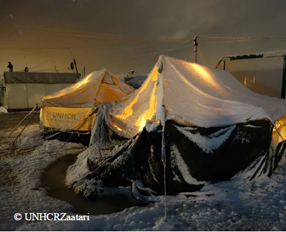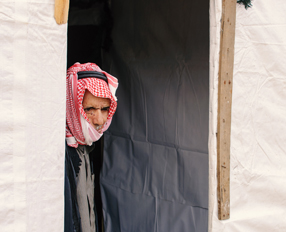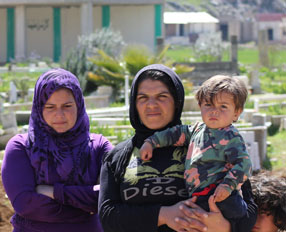In recent days UNHCR reported on how winter and the cold weather are severely affecting families who have fled Iraq ISIS or civil war in Syria and they are refugees elsewhere far from their hometowns in the Middle East.
Extreme weather has played havoc among Syrian refugees hosted in Lebanon, Jordan and Syria.
In the refugee camp Zaatri, extreme weather conditions are causing floods in homes, collapsing tents and forcing hundreds of refugees to wait out the storms to pass in emergency shelters or with neighbours and relatives.
“Winter has brought more hardship to Syrians already in an extreme situation struggling to find safe shelter, food, clothing, and how to protect their families,” said Yacoub El Hillo UNHCR Humanitarian Coordinator in Syria.
Fleeing from this situation are Christian families fled from the persecution of ISIS, and refugee in Baghdad, whom the FPSC tries to help (See #AShoutOfEncouragement).
Regarding the conflict in Syria, the FPSC has been working since it began in 2011. The FPSC has launched a major humanitarian work with the triple objective of saving lives; alleviate suffering and protecting human dignity. The FPSC actions of Humanitarian Aid are primarily aimed at the most vulnerable groups, children, disabled, elderly, women, and minorities, since they suffer more rigorously the consequences of armed conflicts.
In the refugee camps of Jordan (Zaatri) and host communities in both Jordan and Lebanon, actions prioritize refugees with disabilities providing therapeutic services, medicines and technical support, from canes and crutches to wheelchairs and orthopaedic devices.
In Syria we are working in supporting internally displaced persons providing health, education and human rights for people with disabilities in the city of Aleppo.
The FPSC Director of Humanitarian Aid, Enric Roig, answered to a series of questions related to the work of the FPSC in the field of emergency in these countries:
What has caused that the conflicts in Syria and Iraq are breaking all records in terms of volume of refugees?
There are endless reasons that would be impossible to list now. However, some of the most important would be, in my opinion, the duration of the conflict, the hardness of the situation and the existence of a certain “culture” of refugees in the neighbourhood for over 60 years, Palestinians and other groups live as refugees in countries of the area, and before them they already did the Armenians, for example.
In addition, these are countries with medium human development index: the population has access to a certain level of education and resources, and this translates into more and better preparation to face a refugee status.
Finally, we can not fail to mention the “pull effect” that has the emergency management by the United Nations and other actors trying to alleviate the consequences of these conflicts. While this is a necessary, humanitarian aid mechanism that we have all launched, it may encourage more people to seek solution to the conflict through the refugee status.
From a geostrategic point of view, this war pushes refugees to countries already living by themselves in very delicate economic and social conditions. This, is it hampering the situation much?
Definitely, Lebanon and Jordan, for example, are recipients of development aid. Some resources, such as water in Jordan, are particularly scarce. And the local population sees that with the arrival of refugees their own living conditions worsen: prices rise from the rentals until the basic products.
There is less work. Wages fall, because many refugees are willing (forced, you might say) to work in conditions that local people are not willing to assume.
People living around the refugee camps see how daily and free of charge all kinds of products and services such as water, electricity and medicine arrive, for which they must pay more and more money. For these reasons, the Zaatri refugee camp in Jordan has had to close its main entrance for a few days in September to prevent local people attacking humanitarian workers.
As a precaution, the Jordanian government is requiring the NGOs to attend also to Jordanian citizens in our actions: at first they asked us to include 20% of local beneficiaries. Now we are asked that half of our beneficiaries to be from the country.
The mass exodus is being both Christians and Muslims. Is having more difficulty any of the two groups?
In both countries and for different reasons, the situation of Christians is generally more delicate. But among Muslims there are groups as vulnerable as Christians, or more. Personally, I do not think it is necessary or positive to compare suffering or difficulty of groups according to their creed.
Although undoubtedly this crisis is revealing a reality that until recently was virtually unknown in the West: the existence of native Christian communities in the Middle East.
Is it enough the international aid being received? What are the major emergencies?
The aid, although extensive, is never enough. For 2014, and only in reference to the Syrian crisis, the UN valued at 6,500 million the assistance necessary to alleviate the needs of all concerned: it is the greater appeal that the UN has ever done for a single conflict.
At this time, the needs of Syria and Iraq are very different. Iraq is still a recent emergency and needs are the characteristics of this situation: shelter, food, medicines and commodities. Syria, however, has become a “protracted crises” where those affected have been around for months or years living as refugees or displaced. For this reason, together with the above requirements, come into play other needs such as cash assistance, education and psychosocial support.
In what specific tasks is the Foundation working on?
The Foundation for Social Promotion of Culture has worked in many sectors of humanitarian aid, including food aid, non-food items distribution, education or health care
Currently, in the context of the Syrian crisis, we have specialized in the protection and care of people with disabilities. People with disabilities living an armed conflict are among the most vulnerable groups to be found. Many of them have recent disabilities caused by the conflict itself, such as amputation of a limb, or loss of some sense.
Many others suffer double vulnerability for belonging to a vulnerable group (women, elderly, children, minorities) and present a disability. To everyone, regardless of race, gender, religion or political affiliation we try to serve with professionalism, caring and love and provide them with technical aids such as wheelchairs, crutches or walkers.
We have established a clinic in Zaatri Refugee Camp, where we also offer therapeutic rehabilitation services.
In places like Aleppo (Syria) or at various locations in Lebanon we deliver specific medications for people with disabilities.
We are currently working to alleviate the basic needs of displaced Iraqi Christian families from the north of the country to the capital Baghdad living a situation of total insecurity.
There is much need and you can collaborate with emergency projects caused by the conflicts in Syria and Iraq, by contacting the FPSC on the phone number 0034-913440176 or by email: fpsc@fundacionfpsc.org







